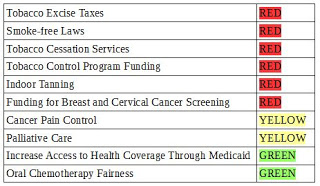Kentucky leads the nation in cancer deaths, but falls short on policies to prevent cancer, especially when it comes to tobacco

The latest edition of “How Do You Measure Up?: A Progress Report on State Legislative Activity to Reduce Cancer Incidence and Mortality” found that Kentucky followed ACS policy recommendations in only two of the 10 issue areas ranked, and showed some progress in two areas, but fell short in six.
 |
| How Kentucky measures up. Red: Falling short Yellow: Some progress Green: Doing Well |
“We’ve made tremendous progress in the way we diagnose and treat cancer across the country. But to leverage this progress, Kentucky legislators must take advantage of the opportunities to pass evidence-based laws and policies that are proven to save lives and money,” Erica Palmer Smith, Kentucky government relations director at ACS, said in a news release.
The report used a color-coded system to rate states in 10 specific areas of public policy that can help fight cancer, including smoke-free laws, tobacco tax levels, funding for tobacco prevention and cessation programs, cessation coverage, funding for cancer screening programs under Medicaid and restricting indoor tanning to minors.
The report also looked at whether or not a state had increased access to health care by expanding Medicaid under federal health reform to people who earn up to 138 percent of the federal poverty level, had passed laws to increase patient quality of life, had passed laws to ensure oral chemotherapy drugs are covered by insurance the same as intravenous chemotherapy, and whether the state offered a well-balanced approach to pain medications.
Green shows that a state has adopted evidence-based policies and best practices; yellow indicates moderate movement toward the benchmark and red shows where states are falling short.
Kentucky fell short for all four tobacco policy measures in the report.
“Tobacco use remains the number one preventable cause of death, so Kentucky’s biggest opportunity to save lives and reduce health care costs starts with addressing the state’s current tobacco control policies,” says the release.
The report found that Kentucky’s cigarette tax, at 60 cents per pack, is less than 50 percent of the national average of $1.65 per pack. The report recommends increasing cigarette taxes by at least a $1 per pack, and then to use that money to pay for tobacco prevention and cessation program. It also recommends similar increases for all tobacco products.
“Evidence clearly shows that raising tobacco prices through regular and significant excise tax increases, encourages tobacco users to quit or cut back and helps prevent young people from ever starting to use tobacco,” says the report.
Kentucky has also been unable to pass a comprehensive statewide smoke-free law and isn’t likely to do so under the leadership of Republican Gov. Matt Bevin, who doesn’t support a statewide ban on smoking, saying the issue should be decided locally.
That being said, about a third of Kentucky’s population is covered by local comprehensive smoke-free policies, and another 10 percent or so live in places that have ordinances with varying exceptions. Kentucky has one of the nation’s highest smoking rates, 26 percent.
 |
| American Cancer Society map; click on it for a larger image and a more readable legend |
Two-thirds of Kentucky adults support a comprehensive statewide smoking ban, according to the latest Kentucky Health Issues Poll, and have since 2013.
“Smoke-free laws reduce exposure to secondhand smoke, encourage and increase quitting among current smokers and reduce health care, cleaning and lost productivity costs,” says the report. “Smoke-free laws also reduce the incidence of cancer, heart disease and other conditions caused by smoking and exposure to tobacco smoke.”
Kentucky’s tobacco-cessation policies also fell short. The report noted that while all Medicaid programs offer some tobacco-cessation coverage, most have varying restrictions that create barriers, like limits on the length of time a person can use certain services.The report says such barriers reduce utilization.
In addition, the amount of money Kentucky spends on tobacco prevention and cessation programs is only 4.4 percent of the amount recommended by the federal Centers for Disease Control and Prevention. In 2016, Kentucky allocated $2.5 million for tobacco prevention; the CDC recommends the state spend $56.4 million.
“For every $20 Big Tobacco spends on marketing their deadly products, states spend just $1 on programs to reduce tobacco use and save lives,” says the report. “States with sustained, well-funded prevention programs have cut youth smoking rates in half or even more, saving lives and reducing state health-care costs.”
In Kentucky, high school smoking rates are 56 percent higher than nationwide, and the adult rate is 74 percent higher. The report blames that on lack of “statewide tobacco-control policies” and says the higher rates cost the state more than $2.7 billion a year in health-care costs.
Kentucky also fell short on its control of indoor tanning, ACS said. The report says Kentucky lawmakers missed out on an opportunity in 2016 to pass legislation to protect minors from the dangers of indoor tanning beds. A bill cleared the Senate Health and Welfare Committee, but wasn’t heard in the Senate.
The other area in which the state fell short, in ACS’s opinion, was state appropriations for breast and cervical cancer screening programs.
Kentucky scored best on policies that centered around access to care. The report said the state has made some progress with its cancer pain control and palliative care policies and was ranked as doing well in the areas of oral chemotherapy fairness and expanding access to care through Medicaid.